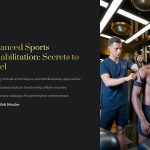 In recent years, the field of sports rehabilitation has seen significant advancements, integrating innovative techniques and interdisciplinary approaches to enhance recovery and performance. As athletes and practitioners strive for excellence, understanding these developments is crucial. This comprehensive guide delves into the latest trends, evidence-based practices, and resources in advanced sports rehabilitation, providing valuable insights for those aiming to excel in this dynamic field.
In recent years, the field of sports rehabilitation has seen significant advancements, integrating innovative techniques and interdisciplinary approaches to enhance recovery and performance. As athletes and practitioners strive for excellence, understanding these developments is crucial. This comprehensive guide delves into the latest trends, evidence-based practices, and resources in advanced sports rehabilitation, providing valuable insights for those aiming to excel in this dynamic field.

Understanding Advanced Sports Rehabilitation
Sports rehabilitation encompasses the processes and strategies employed to help athletes recover from injuries and return to their optimal performance levels. Advanced sports rehabilitation goes beyond traditional methods, incorporating cutting-edge techniques and a holistic approach to address the multifaceted needs of athletes.
Key Components of Advanced Rehabilitation
- Individualized Assessment: Tailoring rehabilitation programs based on the specific needs, goals, and physical conditions of each athlete.
- Multidisciplinary Collaboration: Involving experts from various fields such as physiotherapy, sports psychology, nutrition, and biomechanics to create a comprehensive recovery plan.
- Evidence-Based Practices: Utilizing the latest research and clinical evidence to inform treatment strategies and interventions.
- Technology Integration: Employing advanced tools and technologies, such as motion analysis systems and wearable devices, to monitor progress and enhance rehabilitation outcomes.

The Role of Sports Psychology in Rehabilitation
Mental resilience and psychological well-being are critical components of successful rehabilitation. Integrating sports psychology into rehabilitation programs can significantly improve recovery outcomes.
Psychological Strategies in Rehabilitation
- Goal Setting: Establishing clear, achievable goals to motivate and guide athletes through their recovery journey.
- Imagery and Visualization: Utilizing mental imagery techniques to enhance motor skills and boost confidence during rehabilitation.
- Relaxation Techniques: Implementing methods such as deep breathing and progressive muscle relaxation to reduce stress and promote healing.
For an in-depth exploration of psychological skills and training methods, consider reviewing the following resource:
Explore Psychological Skills Training Methods
Incorporating Technology in Rehabilitation
Advancements in technology have revolutionized sports rehabilitation, offering innovative tools to enhance assessment, treatment, and monitoring processes.
Technological Innovations
- Motion Capture Systems: Analyzing movement patterns to identify dysfunctions and track progress.
- Wearable Devices: Monitoring physiological parameters such as heart rate and muscle activity to tailor rehabilitation programs.
- Virtual Reality (VR): Creating immersive environments for functional training and cognitive engagement during rehabilitation.

Nutritional Strategies for Recovery
Nutrition plays a pivotal role in the recovery process, influencing healing rates, inflammation, and overall performance.
Nutritional Considerations
- Macronutrient Balance: Ensuring adequate intake of proteins, carbohydrates, and fats to support tissue repair and energy needs.
- Micronutrients: Incorporating vitamins and minerals essential for healing, such as vitamin C, zinc, and calcium.
- Hydration: Maintaining optimal hydration levels to facilitate metabolic processes and recovery.
Case Studies and Practical Applications
Examining real-world case studies provides valuable insights into the application of advanced rehabilitation strategies.
Notable Case Studies
- Elite Athlete Recovery: Analysis of rehabilitation protocols that led to successful return-to-play scenarios for professional athletes.
- Innovative Techniques: Implementation of novel therapies, such as blood flow restriction training and its impact on muscle recovery.


esources for Further Learning
For those seeking to deepen their understanding of advanced sports rehabilitation, the following resources offer comprehensive information and practical guidance:
Access Comprehensive Sports Rehabilitation Resources
Explore Sports Psychology Training Modules
Discover Advanced Rehabilitation Techniques
*Capturing unauthorized images is prohibited*


